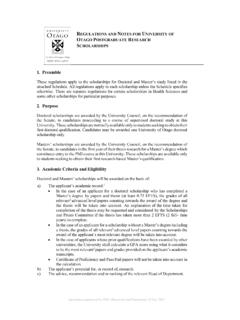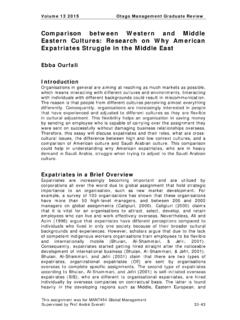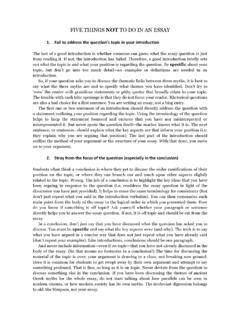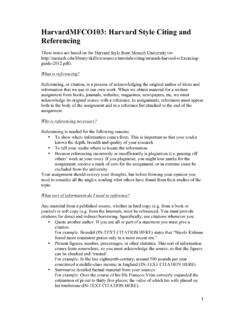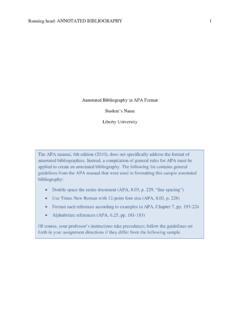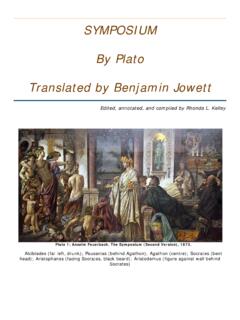Transcription of Writing a Literature Review - University of Otago
1 | | 479 8801 Writing a Literature Review Student Learning Development University of Otago This booklet is an introduction to some of the skills and strategies that will help you successfully complete your studies at Otago . Based on an original booklet developed by Dr Carol Bond and Carole Acheson for the Student Learning Development at the University of Otago . Version Revised 2017 Introduction Postgraduate students in many disciplines, especially Social Sciences and Sciences, need to be able to write a Literature Review . Whether they are Writing a short Review as part of an Honours assignment, or a full-length chapter in a PhD thesis, students consistently find it a struggle to turn the mass of diverse material found in a Literature search into a well-organised critical discussion.
2 The Literature on Writing Literature reviews is generally useful in three areas: describing the aims of the Review ; suggesting how the Literature might be evaluated; and identifying common faults in reviews. When it comes to explaining how to go about actually planning and Writing the Review , though, the Literature tends to offer little guidance beyond vague advice, for example, that there should be some kind of structure to the chapter (Oliver, 2004, ). One guide depressingly takes it for granted that Writing a Review will be a messy, long-drawn-out and repetitive process: Start the first draft of your Review early in your reading.
3 Many more drafts will be required before you have a coherent and critical account (Bell, 2005. ). In response to all the students who wonder how to plan their Literature Review , or who are bogged down in multiple drafts with no end in sight, this study guide offers a practical, step-by-step approach to working efficiently and producing a professional result. The steps outlined have been trialed on willing University of Otago thesis students, and adapted according to their suggestions. If you would like to offer feedback on this guide, especially good ideas to make Writing a Literature Review less effort, please feel free to contact the Student Learning Development: 03 479-8801 Chapter 1: Functions of the Literature Review What is a Literature Review ?
4 A Literature Review has three key components: 1. A search of the Literature available on a given subject area. 2. An evaluation of the Literature , including its scope. 3. A well-structured and argued written account of the Literature that provides an overview and critique. Types of Literature Review 1. Coursework A Literature Review could be: Part of an extended essay on a specific topic to show a grasp of the subject area and provide a context for discussion. Part of an assignment intended to teach research skills as part of a hypothetical research proposal. A stand-alone essay, sometimes using material previously gathered for an annotated bibliography , to present a structured argument critiquing the Literature on a particular subject.
5 2. Theses The nature of the Literature Review depends on the academic discipline. If in doubt, please check with your supervisors before starting the Review . It is also useful to look at some theses in your area (available in your department and online at ) to get an overview of what is required. Typical Arts approach Includes a substantial survey of the Literature in the thesis proposal, to demonstrate the need for the research. Generally reviews Literature throughout the thesis as it becomes relevant to the topic under discussion. Students will be familiar with this method from their undergraduate degrees.
6 Typical Social Science and Science approaches 1. A complete chapter A common thesis structure is to have the following chapters: Introduction, Literature Review , Method, Results, Discussion and Conclusion. The Discussion chapter refers frequently to the Literature Review to consider the relationship between the Literature and the research findings. 2. A series of separate reviews Each chapter begins with a Literature Review relating to the focus of the chapter, so that the thesis is more like a series of essays developing the thesis topic. 3. Systematic reviews A systematic Review , increasingly common in Health Sciences, is the subject of the whole thesis.
7 The purpose is to appraise, summarise, and communicate the results and implications of otherwise unmanageable quantities of research (Green, 2005, p. 270). Students undertaking a systematic Review will probably be required to use a specific methodology designed for health professionals, such as that outlined by the Joanna Briggs Institute for Evidence Based Nursing and Midwifery, or The Cochrane Collaboration. These methodologies are not discussed in this study guide. The Review might include a meta-analysis, a statistical synthesis of findings. Statistical meta-analyses are not discussed in this study guide. The fundamental skills required for a systematic Review , described by Green above as being to appraise, summarise, and communicate, are discussed in the following chapters.
8 The aims of a Literature Review for thesis writers, regardless of the type of Review , are outlined in Table 1 on the next page. Table 1: Aims of the Literature Review for thesis writers To show a thorough professional grasp of the area Identifies the relevant Literature Identifies key ideas, schools of thought, debates and problems Shows understanding of main theories in area, and how these are applied Evaluates previous research Helps avoid unintentional replication of another study To justify your research Identifies gaps in current knowledge Establishes the need for your research Helps define focus and boundaries of your research To justify your approach Discusses previous approaches to topic.
9 Placing your study in context Explains your choice of theoretical framework and methodology To synthesise Literature in the appropriate academic style Provides a well-structured account that follows a logical progression Provides a well-argued account that supports your research question Provides a well-written account, meticulously referenced. Producing a Literature Review is a complex task requiring a range of skills, from collecting material to Writing a professional discussion of what you have found (see Table 1). Subsequent chapters of this guide focus on methods of simplifying your search and the Literature you find, to simplify and speeding up the process of planning and Writing your Review .
10 Although these chapters necessarily follow a logical order the search, record-keeping, making notes, planning the structure etc. - In practice, working efficiently means that that some or all of these processes are on-going, as this study guide explains. Chapter 2: Finding Literature Information regarding searching strategies, databases and referencing guides can be found on the University Library website: You may also wish to explore the information directly relating to your particular subject area by accessing the relevant subject guide: You could also ask your Subject Librarian for guidance. Go to the subject guides on the library website ( ) and then click on the link to your subject; you will see contact details for your Subject Librarian here: Chapter 3: Keeping a Record and Evaluating the Literature Previewing sources Skim through the material you find to see whether the source is relevant before you read it in detail, or print it out.




